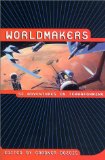Worldmakers
¶ by Rob Friesel Arranged chronologically from 1955 through 2001, Dozois’ anthology Worldmakers: SF Adventures in Terraforming, is a tightly-themed collection of science fiction shorts. It’s a good overview of the terraforming subject’s treatment within the genre but the anthology seems to lack any stand-out stories – there are no great masterpieces in here. Which is not to say that it’s not an enjoyable collection. I mostly picked it up for research purposes (re terraforming and first contact 1) but found it to be a good bed-side item. Perhaps the most interesting aspect of this collection is that, because it is arranged chronologically, you get a sense of how views of terraforming have evolved within the genre over time – what are the in vogue technologies? how central is terraforming to the story? what sorts of politics are involved?
Arranged chronologically from 1955 through 2001, Dozois’ anthology Worldmakers: SF Adventures in Terraforming, is a tightly-themed collection of science fiction shorts. It’s a good overview of the terraforming subject’s treatment within the genre but the anthology seems to lack any stand-out stories – there are no great masterpieces in here. Which is not to say that it’s not an enjoyable collection. I mostly picked it up for research purposes (re terraforming and first contact 1) but found it to be a good bed-side item. Perhaps the most interesting aspect of this collection is that, because it is arranged chronologically, you get a sense of how views of terraforming have evolved within the genre over time – what are the in vogue technologies? how central is terraforming to the story? what sorts of politics are involved?
As for the computed average of my ratings on the individual stories themselves (out to four decimal places), Worldmakers scores: 3.2250
Includes:
- “The Big Rain” by Poul Anderson (1954): ★★½
- “When the People Fell” by Cordwainer Smith (1959): ★★½
- There’s a narrative whimsy that’s a little off-putting; also, reading this made me recall this essay: The Yellow Peril, Fu Manchu, and the Ethnic Future by Lisa Katayama.
- “Before Eden” by Arthur C. Clarke (1961): ★★★
- A bit dry and stilted but the twist at the makes up for it.
- “Hunter, Come Home” by Richard McKenna (1963): ★★★★
- Reminded me a lot of the fungus/mindworms stuff from Sid Meier’s “Alpha Centauri” – and that made it extra endearing.
- “The Keys to December” by Roger Zelazny (1966): ★★½
- “Retrograde Summer” by John Varley (1974): ★★
- “Shall We Take A Little Walk?” by Gregory Benford (1981): ★★
- “The Catharine Wheel” by Ian McDonald (1984): ★★★½
- Felt like “typical McDonald” (gels with my image of his work as reflected best in River of Gods) but felt like it was working more with cyborgian tropes than strict terraforming.
- “Sunken Gardens” by Bruce Sterling (1984): ★★★★½
- Brilliant. But I love Sterling’s work. And the Shaper/Mechanist stuff is always great.
- “Out of Copyright” by Charles Sheffield (1989): ★★★½
- The terraforming bit seemed pretty tangential. Also, when did Sheffield start channelling Cory Doctorow?
- “A Place With Shade” by Robert Reed (1995): ★★★
- Most interesting is the way that Reed casts terraforming in a light that makes it look like the engineer’s rigor has given way to the dilettante’s art.
- “Dawn Venus” by G. David Nordley (1995): ★★★
- “For White Hill” by Joe Haldeman (1995): ★★★★★
- Stunning. Well-crafted and taut.
- “The Road to Reality” by Phillip C. Jennings (1996): ★★½
- Another where the terraforming tropes were off on the side. Speculating about whether to leave a fossil record when building a planet? Cool. Veering off headlong into a cyberworld prison? Huh?
- “Ecopoesis” by Geoffrey A. Landis (1997): ★★★★
- One of the more interesting stories in the whole collection – and I say that even though parts can be a bit hard to follow (esp. w/r/t/ keeping track of characters) and also despite how the romantic bit felt tacked on.
- “People Came From Earth” by Stephen Baxter (1999): ★★★★
- “Fossils” by William H. Keith, Jr. (1999): ★★½
- “A Martian Romance” by Kim Stanley Robinson (1999): ★★★½
- A good story re pacing etc. (and a good ending) but the lead-in was… a little weak? Perhaps this one reads better if you’re familiar with the back-story from Robinson’s previous stories set in this milieu.
- “Dream of Venus” by Pamela Sargent (2000): ★★
- Could have been much stronger if there was more of a focus on Miriam. (Or: “I didn’t much care for this narrator.”) The premise works (and makes a good accompaniment to “Ecopoesis”) but something about it doesn’t carry.
- “At Tide’s Turning” by Laura J. Mixon (2001): ★★★★★
- Great. The terraforming bits fall to the wayside a bit but the rest of the story is so strong (strong enough to make this one the best in the collection?) that it stands well despite falling slightly off the theme. Also: Mixon offers us an well-realized milieu with a great vocabulary.
A version of this review originally appeared on Goodreads.com.
- Though there’s barely any first-contact subject matter in here at all.[↩]
Leave a Reply